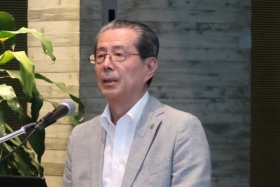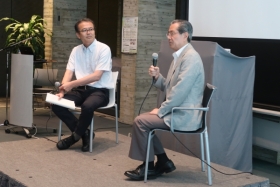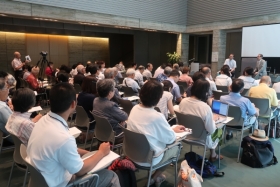June 24 (Sat) – 25 (Sun), Ulaanbaatar, Mongolia
summary of presentations and discussions of the meeting. The secretariat of PSNA
(RECNA) is responsible for its contents.
新着情報What’s New
| 日時: | 2017年7月22日(土)13:30~15:30 |
| 場所: | 国立長崎原爆死没者追悼平和祈念館 交流ラウンジ |
| 講師: | 小溝 泰義 (広島平和文化センター理事長) |
| 森永 玲 (長崎新聞論説委員長/RECNA客員教授)※聞き手 | |
| 主催: | 核兵器廃絶長崎連絡協議会(PCU-NC) |
| 共催: | 長崎大学核兵器廃絶研究センター(RECNA) |
| 講演をする小溝氏 | 森永氏と小溝氏 |
 |
 |
7月22日(土)に、平成29年度核兵器廃絶市民講座「核兵器のない世界を目指して」の第2回目が国立長崎原爆死没者追悼平和祈念館交流ラウンジにて行われました。「核兵器のない平和な世界を目指す平和首長会議の活動」と題し、小溝泰義氏(広島平和文化センター理事長)が講師を務めました。講座の後半では小溝氏と森永玲RECNA客員教授(長崎新聞論説委員長)との対談が行われました。
まず初めに平和首長会議は、「被爆者が訴える核廃絶の思いを重視して平和な世界を実現する」ことを目的としているとの紹介から始まり、併せて、本年8月に長崎市で開催される「平和首長会議総会」は、2020年に「核のない世界」を実現させるための仕上げの総会である、とその意義を述べました。
核兵器廃絶のためには市民社会の役割は大きいとし、世界の指導者を動かしていくために個々が立ち上がることの重要性を強調しました。
後半の対談では、先日採択された核兵器禁止条約について触れ、核保有国も核廃絶についてさらに議論しなければならないと述べました。そうなると、他国も核廃絶に取り組むという連鎖反応が起きるから、それを後押しするために市民社会の運動が大きな役割を果たすだろうと結びました。
講座には約80名の市民が集まりました。核廃絶において、いかに市民一人ひとりが行動を起こしていくかについて考える大切な時間となりました。
講演後には「RECNAと語ろう」を行いました。RECNA教員と参加された市民・学生が、講演の内容やRECNAの今後について語り合いました。
| 会場の様子 |
 |
※本講演会の内容は講演者及び対談者個人の意見を表すものであり、主催団体及び共催団体等の見解を示すものではありません。
2017年9月3日、北朝鮮は6回目の核実験を行った。北朝鮮政府は「大陸弾道弾ミサイル(ICBM)に搭載可能な水爆実験に成功」と発表しており、これまで以上の規模であったと推定されている。度重なるミサイル発射と核実験はとても許される行為ではないが、その対応には冷静な分析が必要だ。6回目となる北朝鮮核実験の意味と当面の対応について、簡単にRECNAの見解をまとめた。
9月2日、顧問の土山秀夫先生が亡くなられたことを受け、追悼文を掲載しました。
鈴木 達治郎 , 黒澤 満 , 広瀬 訓 , 中村 桂子 , 吉田 文彦 , 太田 昌克 , 梅林 宏道 , 桐谷 多恵子 , 朝長 万左男
2017年7月7日はまさに、核兵器廃絶を願うすべての人々にとって、歓迎すべき歴史的な一日となった。RECNAでは、核兵器禁止条約採択をうけて、その歴史的意義と今後の課題について、7月8日付で簡単な見解を発表した。しかし、本条約採択の意義と今後の課題については、より詳細な分析が必要と判断し、RECNAでは教授陣全員で、それぞれの専門分野から、この意義と課題についいて早急にまとめることとした。専門家のみならず、一般の読者にもわかりやすく読めるよう、各著者にはお願いした。
核兵器禁止条約の今後を考えるうえで、少しでもお役に立てれば幸いである。